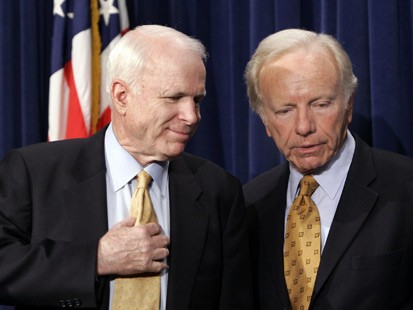GM vs. Afghanistan
 Andrew Sullivan concedes the conservative argument against Obama running GM but then turns it on conservatives:
Andrew Sullivan concedes the conservative argument against Obama running GM but then turns it on conservatives:
But why, pray, does this not equally apply to running Iraq or Afghanistan? Why does our conservative elite believe that these vast, complex, foreign cultures and countries are somehow more manageable than GM? What expertise does Barack Obama have in running Afghanistan?
All he knows is Chicago, Hawaii and America. If you think of the occupations of Iraq and Afghanistan as essentially foreign government take-overs of failed states, why would a conservative believe that it could be successful? If government cannot run a company within its own borders, why do we believe it can build a nation thousands of miles away? If it cannot control its own borders or balance its own books, what on earth is it doing trying to run or reorganize or pacify parts of the world it knows next to nothing about?
Well, one could reasonably argue, it shouldn’t. (See, for example, Michael Cohen on The Counterinsurgency Trap and Steve Hynd on the misguided counterinsurgency consensus.)
Still, the fact of the matter remains that the United States Government employs thousands of people with expertise in foreign affairs (the State Department, National Security Council, congressional foreign affairs staffers, etc.) and hundreds of thousands of people with expertise in military affairs. So far as I know, it employs no people with experience running an automobile company – let alone transforming one to cope with a new era in which it is cornered on all market segments by foreign firms enjoying comparative advantage.
Photo by Flickr user Michael Foley under Creative Commons license.





The guy who heads up the White House’s automobile industry oversight panel has no particular expertise in management let alone in managing an automobile company. There are those who think that’s a good thing but I think it’s naive.
I keep seeing this meme, and it makes no sense to me.
The gov’t can’t run an auto company.
The gov’t can’t run banks.
The obvious fact of the incompetence of the banking and auto execs goes unmentioned. If they’re such experts, why are the taxpayers having to bail them out?
James, with all due respect, foreign policy expertise and military expertise have precious little to do with “state building” and especially with managing what passes for local government in places like Iraq and Afghanistan. There was no expertise in the U.S. government about how to serve as de facto mayors and governors of towns and provinces. What expertise we do have now was learned on the job.
If a young captain can figure out how to manage the complex dynamics that exist in an Iraqi town, why is it so difficult to imagine that people at treasury or elsewhere could similarly become competent at supervising businesses?
The reason it seems hard to believe is because conservatives generally think that governance is easy, but making money is hard. So any 25 year old Heritage foundation intern could go over to Iraq and be given tremendous responsibilities, but only a handful of highly compensated geniuses could be given responsibility in an American corporation.
It is the same attitude that Carly Fiorina had when she said that neither McCain nor Palin could have run HP, but somehow that she was qualified to be deeply involved in politics at the highest levels.
As you point out the government is chocked full of expertise in foreign and military affairs. Not to mention the business of government is government. But the government has demonstrated it can’t run a whore house (Congress excepted).
Fundamentally, the government runs on bribe (spending), intimidation (regulatory and legal threat) and extortion (taxing power). Whereas, a legitimate business must produce a product that people want and sell it at a price they are voluntarily willing to pay that is above the cost of production. The government could possibly take over running the Mob but they have no experience in legitimate business.
Largely but not entirely true. The Army has civil affairs battalions, engineers, and so forth and special operators of all types have some applicable expertise. Still, to the extent any outsider would have this expertise, it’s largely in government or contractable by government.
Given that limited expertise existed, period, in the skills needed to rebuild Iraq, muddling through was our only option. By contrast, a goodly number of people exist with deep knowledge of running automobile firms and other manufacturing businesses. My point isn’t that Timothy Geithner and his associates couldn’t, over time, learn these skills but rather that others have already devoted their lives to doing so.
And we all know how successful THAT was. Your argument is that, since Bush did something dumb, conservatives can’t complain when Obama follows suit? (And many of us complained when we found out what Bush had done; the staffing in Iraq was obviously much less high profile than this.)
Political appointees are quite frequently outsiders. Many of them nonetheless do well, although many don’t.
Returning to basics, we live in a market democracy. Many (essentially all) of what we call industrialized nations, developed nations, or (in the bad old days) first-world nations, are market democracies.
They don’t all take the same lines between the democracy aspect and the market aspect. Many have had explicit Industrial Policy, though that is much less vogue today.
We in America have preferred less market interference, though we have tinkered. We had not just Roosevelt’s New Deal, but also Nixon’s Wage and Price Controls.
Still, most of us prefer markets and business, and only look to government in last resort. Government as lender of last resort, or government as employer of last resort, are old American concepts.
In this case, they are GM-Savior of last resort.
This is not Industrial Policy, and I’m sure Obama as much as anyone wishes GM would just go away from Washington, as soon as possible.
How ironic then that Fiorina could not actually run HP.
So, is Sullivan saying Afghanistan and Iraq should be run as for profit entities, or that GM should be part of the political establishment, building and selling cars to achieve political aims.
I’m thinking one thing is not like the other here.
Color me unimpressed.
No, my argument was that conservatives are in the grips of the false notion that making money is SERIOUS BUSINESS while governance is easy and can and should be entrusted to amateurs and outsourced when possible to private industry.
It is the pathology that considers every Wall Street executive to be fairly compensated and every government employee to be overpaid. It is the madness that leads conservatives to throw absolute fits when Congress gets a pay raise, but then to raise holy hell when people object to tax dollars going to pay seven figure bonuses to de facto bankrupt company execs.
Smart, talented people of goodwill from the business community often do very well when they turn their attention to governance. And, I suspect that smart, talented people of goodwill involved in governance could do very well if they turned their attention to business.
There is nothing magically about running a business or unwinding trades. Expert knowledge often helps… but especially in unstable situations, it becomes a trap. At this juncture, GM would probably do better with some fresh blood and ideas rather than just another group of auto executives who may have “expert knowledge” but who are also trapped by their institutional biases.
Or… in other words… I suspect John McCain would have been a better CEO of HP than Fiorina (admittedly, not a high hurdle) just as he would have been a better president than she.
BTW, some of the blogs I read were quoting Obama as saying some from of GW bankruptcy was likely.
Putting them through BK is the near-market solution, and least like an Industrial Policy to make them our version of British Leyland.
I assume everyone here is good with that?
This is the “Joe-the-plumber” argument all over again. The smart people screwed up, so lets give power to dumb people* instead. Sorry, but I don’t buy it coming from either side.
(*) Not saying the people in charge of handling the GM matter are dumb. But just because people with industry knowledge screwed up, doesn’t mean that they screwed up because they had industry knowledge, or that lacking industry knowledge will somehow make a person more successful.
So by this rationale, during the middle of a war we should fire the general and bring in a non-military person?
I’m thinking you’re pushing your argument too far. Sure, there can be an issue with biases, but biases are probably more insitutional than they are industry wide. For example, I wouldn’t be surprised if a Toyota exec would have very different biases than a GM exec.
Uhhhmmm isn’t that what you are arguing when you write,
On one hand you want new blood that isn’t tied down by insitutional/cultural biases, on the other if you don’t have some with those biases its bad. Which is it?
You seem muddled Bernard, like you want to have your cake and eat it too. Perhaps the issue is more complex. Perhaps sometimes you need to understand the cultural/institutional biases, and at the same time you need to try and overcome them. In some cases it might be possible (e.g. a corporation) in others maybe not (an old and well established culture–e.g. a town in Afghanistan).
Based on some experimental research I’ve read about bubbles I think this is right. You have a situation where the smart people know how the market works. They can make money at it, if they are careful. Then you change a couple of things, and then things go to Hell for awhile. You get bubbles and the follow on crashes. Eventually things stabilize as the new changes are learned.
Putting “dumb people” in charge who have neither the ability nor the inclination to figure things out isn’t the solution, it would exacerbate the problem.
That is certainly possible.
Or, maybe I am making a narrower point… which is that in many cases people matter more than resumes, and that there is no particular reason to believe that government oversight of GM is inherently disastrous just because the people doing the oversight may not have knowledge of the automobile business. Now, if the people put in charge are 25 y/olds from the Center for American Progress whose only qualification is ideological purity, then you are likely to get problems. But if the people who get influence happen to smart, open-minded professional with good judgment then it might turn out for the best.
But really, I am responding because I wanted to address this:
I actually love this example. Have you considering the implications of history for this question? The number of great generals who took command with limited or no experience is surprisingly long. Indeed, many of the great generals in history achieved their greatest fame while still in their 20s.
Alexander was 22 at Issus. Pompey was 24 at the time of his Sicilian campaign. Charles XII was 18 at Narva. Napoleon was 28 during his Italian campaign. I could list two dozen others.
BF
“while governance is easy and can and should be entrusted to amateurs†sarcasm understood.
You mean like electing a President with no executive experience?
In Iraq and Afghanistan our government is trying to teach others how to govern. If left alone other less able and less friendly governments would step in. In failing businesses if lift alone would correct themselves or would fold and be taken over by other businesses that could make it work. Our government is inept at business and should let those who are capable at business do it without interference.
Our government isn’t that good at government either but until of late, has done a better job than most others.
BF
Alexander and Napoleon both had military experience before taking command of an army. Alexander was a regent at 16 and at 18 fought underneath his father King Phillip not to mention all the training he received in military matters. Yes many historic figures were young but that was the nature of their times not to mention many inherited a great deal such as being king.
Wayne… well, sure, but the average 30 year old Major in the U.S. army has 12 years of military experience going back to ROTC/Service Academies… and yet, we would never consider giving one of them command of a theater. We now believe that command or an Army can only be given to someone with 30 years of experience. History suggests, I think, that much, much less experience is actually required.
Similarly, the notion that the only people capable of contributing to GM are people with 30 years of experience in “Big Business” is likely also false.
But whatever… I am not going to convince anyone on this score. As much as I like tilting at windmills, I know a losing battle when I see one.
I agree that experience isn’t everything especially since sometime it takes new ideas or the willingness to take risk which is usually more of a youthful trait. Of course for everyone that took risk and succeed there are many more that failed. However those with some experience will have a much greater chance of succeeding than someone with no experience.
As for history, it is not fair to compare ages directly with today’s military. Also there are so many other factors to take effect such as nutrition rates due to deaths and experience of opposing leaders.
It should be needless to say that it would be foolish to fire one of today’s combat general and replace him with Hillary.
FYI , there something to be said about chasing windmills.
One more thing, being a prince, Alexander was probably taught military and political matters since he was in diapers. So by age 22 he already had 20 some years of training including having actual combat experiences.
Uhhhmmm not quite answering my question here. I wasn’t saying fire one general and replace him wiht another with less experience. I was saying fire the general and replace him with a baker, or a machinist, or an artist.
Was Alexander a baker?
Oh, and what about the young generals who were complete flops? Or do they not make it into the history books? Serious question. I don’t doubt that there are young, rather “green” generals that make the cut. But 1,000,000 monkeys typing for 1,000,000 years and all that.